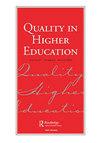An evolution of performance data in higher education governance: a path towards a ‘big data’ era?
IF 1.5
Q3 EDUCATION & EDUCATIONAL RESEARCH
引用次数: 9
Abstract
ABSTRACT Performance data in higher education has gone through a major development in the last few decades. Simple input measures have given way to increasingly nuanced and dynamic output measures and performance indicators have become an integral part of management at the organisational and system level. The evolution of higher education performance measurement shows a reiterative relationship between data availability, its purpose in a governance system and its target audience. Digitalisation of learning, management and communication systems has revolutionised data availability, creating new possibilities for ‘big data’ use. Based on insights from the past evolution, current experiments with ‘big data’ and lessons from other sectors, the article explores what the new ‘big data’ era might mean for higher education governance. The high volume of data but also its speed of accumulation and related analytical techniques, are likely to substantially transform the current relationship between data and performance but also create some technical, ethical and policy challenges.高等教育治理中绩效数据的演变:通往“大数据”时代的道路?
在过去的几十年里,高等教育的绩效数据经历了一个重大的发展。简单的投入措施已让位于日益细致和动态的产出措施,业绩指标已成为组织和系统一级管理的组成部分。高等教育绩效测量的演变表明,数据可用性、治理系统中的目的及其目标受众之间存在着一种反复的关系。学习、管理和通信系统的数字化彻底改变了数据的可用性,为“大数据”的使用创造了新的可能性。基于对过去演变的见解、当前“大数据”实验以及其他领域的经验教训,本文探讨了新的“大数据”时代对高等教育治理可能意味着什么。大量的数据及其积累的速度和相关的分析技术,可能会大大改变当前数据与绩效之间的关系,但也会产生一些技术、道德和政策方面的挑战。
本文章由计算机程序翻译,如有差异,请以英文原文为准。
求助全文
约1分钟内获得全文
求助全文
来源期刊

Quality in Higher Education
EDUCATION & EDUCATIONAL RESEARCH-
CiteScore
3.30
自引率
14.30%
发文量
32
期刊介绍:
Quality in Higher Education is aimed at those interested in the theory, practice and policies relating to the control, management and improvement of quality in higher education. The journal is receptive to critical, phenomenological as well as positivistic studies. The journal would like to publish more studies that use hermeneutic, semiotic, ethnographic or dialectical research as well as the more traditional studies based on quantitative surveys and in-depth interviews and focus groups. Papers that have empirical research content are particularly welcome. The editor especially wishes to encourage papers on: reported research results, especially where these assess the impact of quality assurance systems, procedures and methodologies; theoretical analyses of quality and quality initiatives in higher education; comparative evaluation and international aspects of practice and policy with a view to identifying transportable methods, systems and good practice; quality assurance and standards monitoring of transnational higher education; the nature and impact and student feedback; improvements in learning and teaching that impact on quality and standards; links between quality assurance and employability; evaluations of the impact of quality procedures at national level, backed up by research evidence.
 求助内容:
求助内容: 应助结果提醒方式:
应助结果提醒方式:


